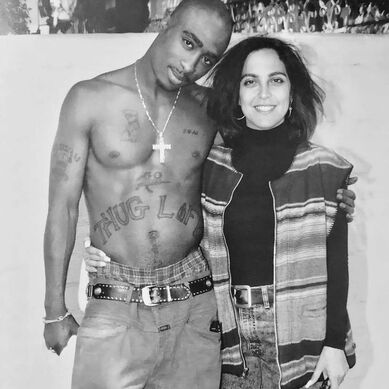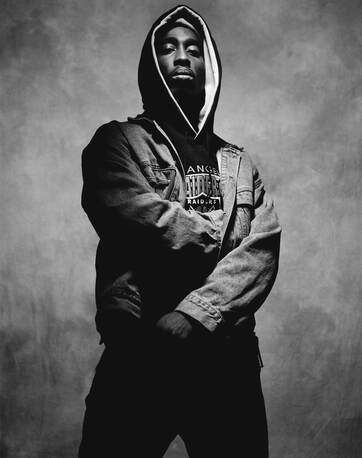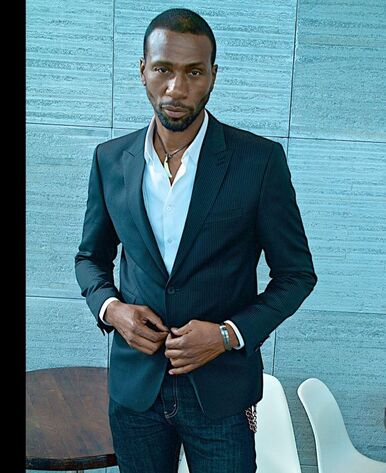|
Leila Steinberg on discovering a 17 year old Tupac Shakur for her Bay Area artist workshop, The Mic Sessions:
“The reason Tupac came about is because I kept saying, ‘Oh gosh, we need a rapper that is about social justice, that gets some of the same things [as me].’ I kept looking for someone that was kind of like me; someone who read like crazy and could tackle issues that we don’t talk about. Public Enemy was too radical. There were artists that were in hip hop that were using their voices, but they couldn’t penetrate the schools, because they were too extreme. I was looking for somebody that could straddle these worlds like I could. One day Luanda, who was one of our group members said there was a kid that just came from Baltimore, and that he was it. She’s the reason Pac came to the group. He had lots of poems. Poems, lyrics… and from the first poem, I knew.” Leila Steinberg On Tupac being exploited, financially: “I didn’t know what I couldn’t do. I thought it was tangible to change the world. I thought it was tangible to change the hearts of the planet. When the two of us connected, it was like, ‘Oh, we’re about to make a massive difference! What I didn’t understand was this industry, how toxic this world is, and the role of money and what having that level of attention and access and money would do to all of us. I think the tragedy and what happened with Pac that people don’t analyze and dissect is the complication of how much money we make off of talent, what that does to talent, and the pressure that it puts on a young gifted soul that really entered wanting to make a difference.” “I don’t think, I know Tupac was exploited financially. I witnessed it. I witnessed the direction of his career and the power people that didn’t want to hear my voice or my resistance. I did choose to stop managing him, but I stayed close and there were people making a ton of money from the beginning of his career until the end of his career. Back then, if you were an artist in the early ‘90s, you got an 8 to 12 point deal. Points are percentages (1 point is equal to 1%), so if you look at a pie and you look at 100%, back then with CDs selling for $15.00, a piece and you sell a million, and he sold a lot more than that. Just look at the numbers. Let’s say he got 12 points. You pay your producer 4 of those 12, your manager. You really walk away with what? 4 or 5 points of your 100. That was typical, and we’re still talking about the exploitation, primarily of people of color.” “Tupac did make some money, but he didn’t have access to it. At the end Suge controlled all of it. Millions we made. Tupac did own some houses. He saw a million, but what’s a million? It’s crumbs. There were hundreds of millions made off of Tupac. There are people who own homes and property now off of Tupac money, and it’s not those of us that were there grinding and working.” Leila Steinberg on fights between Leila and Tupac in the last years of his life: “Our fights were a fight for his soul. It was a fight for him to not get consumed by the company he was in. I already saw him getting consumed by the industry and the lifestyle, pre-Suge [Knight]. He was fighting for his life then. I think Malcolm X’s story is really important here. I think a lot of people rock Malcolm X hats and gear, and they don’t even really know his story and never read his book. Tupac loved Malcolm X, because he loved {Malcolm X’s] journey. He loved that Malcolm X made mistakes and that he had an entire transformation, which is why he left the Nation [of Islam]. It’s the transformation that is important in this story, and what it was to be in a radical fight for Black people, and then his transition into Islam; and true Islam embraced all people. I think Tupac’s trajectory was the opposite. Tupac started out with this incredible vision. He was always caused-based and his whole life he wanted to dedicate to making the difference. And what happened was, you cannot surround yourself with toxic things, toxic people and toxic behavior. You become what you want to save. Pac is the classic example of being surrounded and sucked in and not having a way out; not being able to free himself from the clutches of that. Tupac was never a gangster, that was not him. I was surrounded by more of those elements than he ever was. He just wanted to make that difference, and he ended up really making horrible choices and getting caught up. That’s the tragedy.”
Leila Steinberg on why Tupac Shakur is not alive today:
“He had many lucid moments when he got it and he wanted out. Oh, he wanted out. But some lines you cross, you can’t come back from. The deal with Suge, you can’t come back from that. He couldn’t just walk away. I don’t think he ever wanted in [with Death Row Records]. He was in jail and desperate, and he made a move based on desperation, and he did not understand the cost or the consequence because he was dealing with real gangsters. He is not alive today because he was dealing with real gang members. That was not him. He thought he could do this deal, get out, give Suge these three records and have his freedom. It didn’t work that way. It was never going to work that way.” “Tupac always was angry. He always had a temper. He was very dramatic and amplified, and it all got skewed. The lines get blurred. His erupting looked like [gang] participation, but there were two different eruptions happening. He never joined the Bloods or the Crips, or anything. He was not an active gang member. He wanted to be the one that could organize the treaties between all of them. He thought he could go anywhere, walk anywhere, be in any hood. It doesn’t work that way. He was in over his head.” Leila Steinberg on actor Omari Hardwick getting discovered at Leila’s famous ‘Mic Sessions’ workshop: “Omari was in workshop, he got his agent out of my workshop and got his first breaks at my workshop. Omari’s a brilliant talent. He definitely grew in the space. I always want to say, ‘Can I use the early footage from when you first started?’ (laughs), because I have all the early tapes from when he was working a lot of stuff out. He was doing poems, monologues, raps, all of that. It’s hard because Omari really hit as an actor, and did so well. You get pigeonholed and they don’t want to let you be the full artist you are. Omari was a brilliant musician, rapper, singer. He could do it all. And he has not been supported in that journey. I tried to help Omari a number of times. I hit people up. It’s a difficult industry and that’s where we need to change the face of the owners of companies. We still have so much work to do.” On why it was easier for Tupac to act and rap, and not easy for Omari Hardwick to break into music: “It was easier for Tupac, because he entered music and ended up in acting, so then you can bring your music into the acting. If you start in acting, it’s really hard. They don’t want you taking time away. There is so much more money in acting.” Leila Steinberg on how Tupac’s movie roles influenced his personality: “In music you give people you. You pour your heart out. You get to know someone’s soul and their being through their music. In acting, you play all these other people. You run from you. And Tupac was a runner. He was challenged throughout his whole journey. He went through so much, that he loved escaping into different roles to explore all the different facets of himself. But, you know, people talk about Juice and what that character did to him. It definitely did something to him. Every character does something to the actor. You live and you breathe this character and it consumes you, and it spills into your [other] work. So that definitely happened.” “We never got to see who he could have become. He wrote three films. Maybe one day they’ll come out.” Leila Steinberg on Keffe D’s arrest for the murder of Tupac Shakur: “Is it justice? Yeah, somewhat. But, you know, Keffe D lived his life for the last 27 years. There is some relief, but it’s complicated. He wasn’t the only one involved. It’s going to take some years for this to play out. Does it make me feel better? Not really. I didn’t have some sense of relief or of feeling better. I want justice. I believe in justice, so yes, I think it was important. It’s important that these next few years play out, but it didn’t make me feel any better, or whatever I thought maybe I would feel. Does Leila believe there are others involved in the murder of Tupac who are still alive today?: “One hundred percent, yeah; on every side of everything. It’s kind of amazing it went this long without it coming out. People always tell on themselves. The truth always finds the light. There are definitely plenty of people who knew, and there is also the role of law enforcement. It was in Vegas. There’s cameras everywhere. How do you have such a high profile city and no one knows or sees anything?” About Journalist and Podcast Host Allison Kugel Allison Kugel is a veteran entertainment journalist and host of the Allison Interviews podcast. Watch and embed the entire interview video with Leila Steinberg @YouTube. Listen to the audio podcast on Apple Podcasts, Spotify. Follow Allison Kugel on Instagram @theallisonkugel and at AllisonInterviews.com
SELF denied Holy Warrior for Jesus Holy Trinity
12/7/2023 08:09:06 pm
What's ANY 1 think it's past-2 date been = It's SLOW & STEADY NON voluntary, NON optional & enforceable GENOCIDE = It's gonna be literal, incomprehensible CAN DO focused priorities, misc CRYSTAL CLEAR, meticulous (showing great attention to detail; very careful & precise) & keen, Russian roulette, ALL out across the USA - global board murder - suicide, purging weed's of a garden (being dying non human innocent Earth), sanitizing, annihilation, genocidal, bloodbath, massacre, eradicating, extermination by 2025 & not even the word nightmare nor Crime's against humanity can scratch the surface. & USA government had hand in 9/11/2001 JUST A TEST 2 see how the public civilian masses would react, dead 13 soldiers in Afghanistan (2021), like DARPA-HARPA agencies had hand in (Covid, misc) vaccines in lab's cooking it all up & like history, worse Coming!
Reply
Leave a Reply. |
NOPE! YOU DON'T HAVE WRITER'S BLOCK. Course Coming Soon! Click Here to Learn More & Sign Up to Be Notified!
Hi There!
Thank you for visiting, and for taking interest in my work as a journalist. It means the world to me! I would love to share more of my story with you through my book, Journaling Fame: A memoir of a life unhinged and on the record. Funny title, right? I try to inject irony and humor into everything I do. It makes life more interesting. Humor aside, my book delves into my life as an entertainment journalist with lots of fun and interesting behind-the-scenes moments. However, I also take you on an intimate journey through my experiences with anxiety, panic attacks and OCD that I experienced since childhood; and how I found healing and strength through those experiences. I would be honored to have you read my story, and I hope it helps you or someone you love. Just click the Amazon button above, below my book cover, to get your copy. With Love, Allison XO |
Get Allison's Interviews in Your Inbox

aboutAllison Kugel is an entertainment and pop culture journalist with a syndicated interview column that reaches more than 10 million readers throughout the United States, Canada, UK and Australia.
|
pages |
Copyright © 2020





